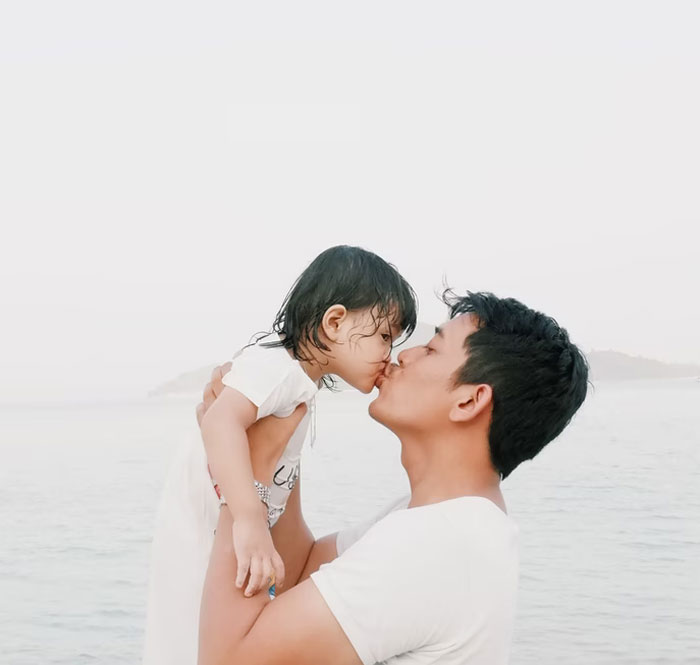Each and every action has consequences that we can’t predict. Even the tiniest things can have a deep, long-lasting impact. Not just on us! On the people who we care about the most. And even the most seemingly harmless things that parents do can have some really serious consequences for their children’s lives.
That’s what Reddit users have been discussing after u/DL4MISH created a thread on r/AskReddit about these small, allegedly harmless things that some parents do. The discussion really took off: their question got a whopping 1.2k comments. Scroll down, have a read, and let us know which of these opinions you agree with, dear Pandas.
Each and every parent should do their best to provide a healthy, happy home for their children, however, they can sometimes lose sight of what’s most important. For example, being overprotective can be just as bad as not being protective enough, and we shouldn’t forget that our kids are individuals with their own unique needs.
Bored Panda wanted to learn more about how to be a better parent and what pitfalls to avoid, so I reached out to author and child independence expert Lenore Skenazy, the president of Let Grow and the founder of the Free-Range Kids movement, as well as parenting blogger Samantha Scroggin, the founder of Walking Outside in Slippers. Scroll down for both in-depth interviews.
#1
Not letting them have privacy. My mother never let me have absolutely anything private, she always searched absolutely everything for me and if she found something she didn’t like, she humiliated me for it or threw it away without telling me anything. Now I am extremely possessive of my things and panic when someone looks in one of my drawers or anything like that. My partner thinks I don’t trust him, but I just have an absolute trauma with anyone looking at my stuff and I feel ashamed and guilty for absolutely anything private that I have.

Image source: Denislovage, Karolina Grabowska
#2
Saying “you’re so mature for your age”
No
I was a smart anxious child who learned quickly to please adults to stay out of trouble and I also had to raise my siblings and sometimes cousins …
Most girls I know who were told this also had to deal with some type of adultification

Image source: lucycolt90, Annie Spratt
#3
Whenever I get a bad grade on something my parents always tell me that “I’m smarter than that” or “I’m not trying my best”. It doesn’t sound bad, but it has seriously messed me up, because I really am trying my best, but it just isn’t good enough. They think I’m smarter then I actually am, and it sucks because they have unrealistic expectations of me.

Image source: MallowBrain13, Andrea Piacquadio
#4
“You have it so easy, I wish I only had your problems.” Teaches kids that their problem are never good enough to struggle over. Makes them feel guilty when they need help with something.

Image source: Dinosaur-Hugs, Lucas Metz
#5
Along with snooping, being overly strict. The children of really strict parents learn how to lie, steal, sneak out, all because their parents are so damn strict. It doesn’t teach a child anything, except that they cannot trust their parents to have their back. Yes, you need to to have rules and boundaries with your kids, but you’re not the gestapo, they’re allowed to hand secrets!
My father built special boxes for all his grandkids, they’re beautiful, and have special locks. For example, one is shaped like a piano, and to open it, you need to play the keys in a certain order. He can change this order if needs be, (there are over 1,000,000 possible combinations) and only he and the child know the combination. They are also designed that the child will know if someone has tried to open the box. Their Mum, my SIL, HATES this. She cannot stand that the kids can hide things from her, and has been trying for years to get my Dad to tell her the combination. (Sometimes he will just to shut her up, then immediately changes it. I don’t know why she bothers!)
Thing was, he had zero privacy growing up, and knows how much he hated it, so made sure his grandkids didn’t go through the same thing. Wish he’d done it for me, my mother has no concept of other people’s privacy, and has no trouble even now going through my papers if she can. The result? I’m FABULOUS at hiding things!
Kids need to know they’re trusted. Constantly treating then like the enemy will do nothing but make them the enemy!

Image source: SassyDivaAunt, Monstera
#6
Not getting help for their own traumas. They pass it to their kids

Image source: Ocean_waves726, Jordan Whitt
#7
Not seeing them as individuals and not listening to them. seriously, listen to that mini-person that you literally brought into the world. Of course, their problems will be different than yours & adult problems but that doesn’t mean that it is manageable for them. You basically making them believe that they are insignificant which will haunt them for the rest of their lives.

Image source: progressiveavocado, Pixabay
#8
Tell them they can’t play with a toy because it’s for the opposite sex.

Image source: retsis-elttil, RODNAE Production
#9
Force them (especially little girls) to hug or kiss people when they don’t want to. This establishes lack of ownership in their own body, the inability to say no to unwanted touch, and teaches them it is their job to make others feel comfortable at the expense of their own comfort.
Also praising them for being smart instead of hardworking. This leads to kids coasting on their intelligence then peaking and failing because they don’t have practice and habits of working hard at something challenging. I see this a lot with gifted kids who are completely lost once they go to college or get a job.
Having an overly close relationship, venting to them about your problems, and using them for emotional support. If you want to learn more, Google “emotional incest”.

Image source: BaylisAscaris, Devi Puspita Amartha Yahya
#10
When they make fun of their kids to get a laugh out of friends / family at dinner and stuff. Really has a horrible effect on children. Thankfully never happened to me though.

Image source: FaynHimSelf, Priscilla Du Preez
#11
Benign neglect. My therapist informed me this is not “benign”. I guess this is the opposite of the helicopter parent. While my mom made sure we were fed and healthy, she also didn’t do much to connect with me one on one. I forgive her because honestly she had a lot on her plate with six kids including one that was seriously ADHD, but it was still damaging.

Image source: Jrsygrrl, Zhivko Minkov
#12
Tricking / pranking them. I’ve seen a few videos of Christmas or birthdays where parents have given their kid something like a PlayStation 5 box which doesn’t have one in. It doesn’t matter if they pull one out from behind the sofa after a few seconds of confusion, tears and anger, they’ve taught their kid a powerful lesson about their relationship. There’s no way that’s not going to come back to hurt everyone later on.

Image source: Crypt0Nihilist
#13
If parents are divorced, unless the other parent is a legit horrible person, talking really bad stuff about the other parent in front of the other child

Image source: SalFunction12, Nik Shuliahin
#14
“There is no such thing as mental illness, it’s just weakness.” I needed help as a teen and did not get. I felt so guilty seeking help as an adult. I have bipolar disorder, still sometimes feel guilty for being medicated though I am now in my forties.

Image source: Mdp1342, Fernando @cferdo
#15
Destroy a sense of confidence through constant criticism.

Image source: The_Polar_Bear__, Alex Green
#16
I think alot of parents cause food/weight issues unintentionally. And that is something I have personally taken very seriously as a parent. Creating a healthy relationship with food.

Image source: wh_ro_ry
#17
Bulldoze parenting. Which in my opinion is worse than helicopter parenting. For those who don’t know; bulldozer parenting is when you essentially remove every obstacle your child faces out of fear of them getting hurt, discouraged, down on themselves, or failing at something.
As a parent of 4, it’s extremely hard to not do this because it breaks your heart watching them hurt. However, it makes them stronger and is way better.

Image source: ShextMe, Greta Hoffman
#18
Making fun of or heavily criticizing a child’s accent, speech impediment, or othe linguistic trait. When I was a kid, my mom said my accent made me sound “unintelligent”. So I suppressed it and now I have a permanent stutter, which she also mocked me for, which makes it worse. I hate speaking now, it feels embarrassing.

Image source: GrimGrnningGorehound, Ksenia Makagonova
#19
Comparing them to other kids, can really mess with your youngsters confidence.

Image source: Dozer2023, ottonbro
#20
“Are you physically hurt? No? Then stop crying.” Guess what I never stop doing as a 30 year old?
Additionally, my parents made the decision to not medicate me when I was diagnosed with ADD in the late 90s. My mother (to this day) thinks I swayed the test results because I was/am a people pleaser and I thought I was doing what the adults wanted to happen. Both my parents thought having the medication on my permanent health record would make getting jobs and healthcare difficult for me in the future. So now I live as a diagnosed adult who isn’t on meds because that mindset is something I’m still unlearning. Stigmatized family topics are fun.

Image source: DjinnAndGingerale, Anthony Tran
#21
Parents saying “i’m the parent” or “i’m doing my best” in response to your frustration. any argument i’m in with my mom, her reason why is because “she’s the parent”. it makes me feel invalidated as a kid.
if you’re a parent and you don’t have a good reason for something, or won’t reveal the real reason when your kid asks why, you should rethink your priorities. an “i said no because i’m the parent” response to a kid asking to color their hair doesn’t help anything. if you really don’t want them to, explain using real reasons.
seniority does not inherently mean respect. treat kids as small people with less experience, not as beings who are lesser-than.
Image source: Substantial_Ad7387
#22
Shipping them with their friends or teasing them about liking someone who is really just a friend
Needless to say this is stopping me from ever making a boy friend (not boyfriend BUT BOY FRIEND)
Also has made me stop being friends with some cool people (not parents but classmates who do the same)
Image source: CanisIupus
#23
Discussing adult problems/fears with them or around them. It can instill unnecessary fears which leads to anxiety problems. Or embarrassing them in front of others
Image source: QuestionDarts
#24
My mom always used to tell me how gross sex is and now I have intimacy issues.

Image source: JewelerSubject9134, Womanizer Toys
#25
Snooping.
If you want your kid to get really good at hiding things from you and lying to you, this is how you do it. And as a bonus, they’ll probably never trust you around their things in the future, if they keep in contact with you at all after they move out.
Image source: Piper_Loved_That
#26
Don’t tell kids that reading and school are more important than interpersonal relationships.
Also don’t hit kids or teach them to associate fear and pain with love. It’ll hurt their chances of having normal relationships in the future.
Image source: GrimGrnningGorehound
#27
Do not use food as a reward. Especially the same food over and over again.
Otherwise you’re getting a kid who subconsciously connects the two, gets happiness from eating that food, and will overeat it to the point of obesity, especially if its junk food.
Example me, with fries.
Image source: NowWithMoreChocolate
#28
Micro managing your children Let them play let them be on their own.
Image source: Netprincess
#29
Simply handing them money.
It quite the needle to thread to figure out how to get money into your kids’ hands without it becoming an expectation, an entitlement. We want to give our kids stuff. But we don’t want it to create problems.
Helping kids learn the value of money is important.

Image source: geo_mallory, Alexander Mils
#30
When they reprimand their kids about a certain habit or action that the parents themselves do (or do to the kids) – it gives the idea that yes, my parent knows that this is wrong and is telling me that it is wrong but they still do it so maybe I can do it as well. Seems like it’s a way to develop cognitive dissonance in kids.
Image source: UnderTheFishHook
 Follow Us
Follow Us





